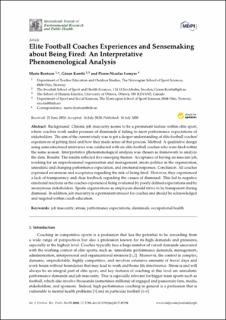| dc.contributor.author | Bentzen, Marte | |
| dc.contributor.author | Kenttä, Göran | |
| dc.contributor.author | Lemyre, Nicolas | |
| dc.date.accessioned | 2021-03-12T07:40:11Z | |
| dc.date.available | 2021-03-12T07:40:11Z | |
| dc.date.created | 2020-08-19T13:36:03Z | |
| dc.date.issued | 2020 | |
| dc.identifier.citation | International Journal of Environmental Research and Public Health (IJERPH). 2020, 17(14), Artikkel 5196. | en_US |
| dc.identifier.issn | 1661-7827 | |
| dc.identifier.uri | https://hdl.handle.net/11250/2733003 | |
| dc.description | This is an open access article distributed under the Creative Commons Attribution License (https://creativecommons.org/licenses/by/4.0/) which permits unrestricted use, distribution, and reproduction in any medium, provided the original work is properly cited. | en_US |
| dc.description.abstract | Background: Chronic job insecurity seems to be a prominent feature within elite sport, where coaches work under pressure of dismissals if failing to meet performance expectations of stakeholders. The aim of the current study was to get a deeper understanding of elite football coaches’ experiences of getting fired and how they made sense of that process. Method: A qualitative design using semi-structured interviews was conducted with six elite football coaches who were fired within the same season. Interpretative phenomenological analysis was chosen as framework to analyze the data. Results: The results reflected five emerging themes: Acceptance of having an insecure job, working for an unprofessional organization and management, micro-politics in the organization, unrealistic and changing performance expectation, and emotional responses. Conclusion: All coaches expressed awareness and acceptance regarding the risk of being fired. However, they experienced a lack of transparency and clear feedback regarding the causes of dismissal. This led to negative emotional reactions as the coaches experienced being evaluated by poorly defined expectations and by anonymous stakeholders. Sports organizations as employers should strive to be transparent during dismissal. In addition, job insecurity is a permanent stressor for coaches and should be acknowledged and targeted within coach education. | en_US |
| dc.language.iso | eng | en_US |
| dc.subject | job insecurity | en_US |
| dc.subject | stress | en_US |
| dc.subject | performance expectations | en_US |
| dc.subject | dismissals | en_US |
| dc.subject | occupational health | en_US |
| dc.title | Elite football coaches experiences and sensemaking about being fired: An interpretative phenomenological analysis | en_US |
| dc.type | Peer reviewed | en_US |
| dc.type | Journal article | en_US |
| dc.description.version | publishedVersion | en_US |
| dc.rights.holder | © 2020 by the authors. | en_US |
| dc.source.pagenumber | 13 | en_US |
| dc.source.volume | 17 | en_US |
| dc.source.journal | International Journal of Environmental Research and Public Health (IJERPH) | en_US |
| dc.source.issue | 14 | en_US |
| dc.identifier.doi | 10.3390/ijerph17145196 | |
| dc.identifier.cristin | 1824066 | |
| dc.description.localcode | Institutt for lærerutdanning og friluftslivsstudier / Department of Teacher Education and Outdoor Studies | en_US |
| cristin.ispublished | true | |
| cristin.fulltext | original | |
| cristin.qualitycode | 1 | |
